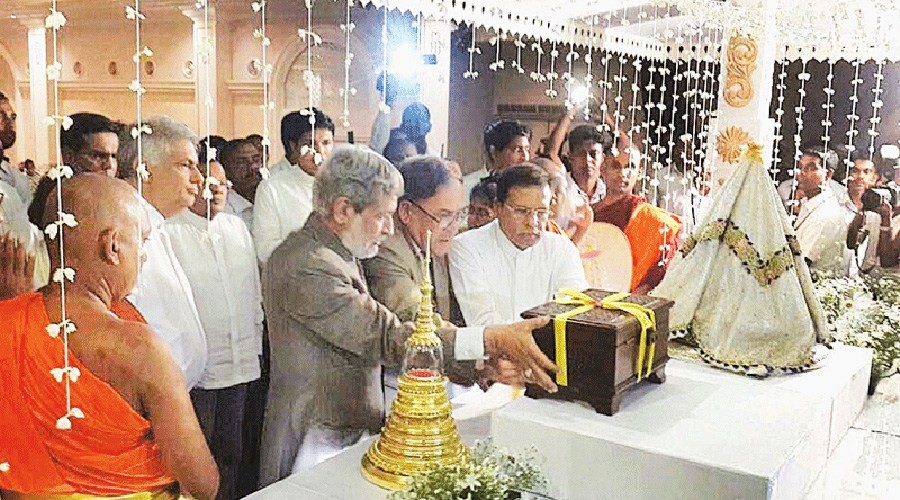International Religious News Updates (4th Week of April)
Pakistan to send Buddhist relics to Srilanka
Pakistan will send Buddhist relics to Sri Lanka on the occasion of Vesak to be celebrated on April 29, a statement from the Office of the Sri Lankan Prime Minister said on Friday. The relics would be kept for public veneration at the Prime Minister’s official residence from April 29 till May 3, Xinhua news reported citing the statement.
Earlier, India also announced that it would send the sacred Buddhist relics to Sri Lanka in view of the Vesak celebration. Vesak is celebrated on April 29 by Buddhists in Sri Lanka to mark the birth, the enlightenment and the passing away of the Buddha.

Pope Invites Chilean victims to Vatican
The Vatican in a press release announced that Pope Francis had invited three Chilean victims of clerical sexual abuse to visit him at his residence in the Vatican this weekend and meet with him in private.
According to the report Pope thanked the men — Juan Carlos Cruz, James Hamilton and Jose Andres Murillo — for having accepted his invitation, saying he will “ask for their forgiveness, share their pain for what they suffered, and above all, listen to all their suggestions to ensure that these reproachable incidents are never repeated.” Pope will see each of the men individually, to allow that each can speak as long as he felt he wanted to.”
The men have accused Bishop Juan Barros and others in the Chilean Church hierarchy of covering up Father Fernando Karadima’s alleged sex crimes. The Vatican removed Karadima from the ministry in 2011 following reports that he sexually abused minors and he was sentenced to a lifetime of penance and prayer. Karadima later refuted the accusations of sexual abuse of children in a civil court in Chile in 2015. He was not sentenced because the statute of limitations had expired although the judge said he found the accusations truthful. Barros reportedly has offered his resignation to the pope in the past, who has rejected it.
The three were invited to the Vatican after Francis received a 2,300-page report by Bishop Charles Scicluna. The report was never made public but supposedly included the testimonies of 64 individuals who spoke about sex abuse cases of minors by the clergy and the subsequent cover-up by the Chilean church.
Many people, especially Chileans, had been shocked and dismayed by the pope’s comments about the Chilean cases during his trip, when he said he didn’t believe there was any substance to the accusations and had accused the victims of slander.
Pope creates new diocese in Thailand, appoints bishop in Vietnam
Pope Francis recently created a new diocese in Thailand with a new bishop and appointed another bishop in Vietnam.
Pope Francis created the Diocese of Chang Rai in north-east Thailand and appointed Father Joseph Vuthiler Haelom as its first bishop. The new diocese has been created out of the territories of Chiang Mai, making it a suffragan of the Metropolitan Archdiocese of Bangkok. Comprising four provinces and a district, Chang Rai Diocese will be a suffragan for the Metropolitan Archdiocese of Bangkok. The episcopal seat of the new diocese will be in Chiang Rai and its Cathedral Church will be the parish Church of the Nativity of Our Lady.
Bishop designate, Fr. Haelom was born on 17 December, 1951 in Lamsai, in the Province of Pathumthani in the Archdiocese of Bangkok. He entered the Diocesan Minor Seminary in Bangkok and subsequently completed his philosophical and theological studies at the Lux Mundi National Seminary in Sampran. He was ordained priest on 3 August 1980 and incardinated into the Archdiocese of Bangkok.
Pope Francis appointed Father Joseph Nguyen Duc Cuong the new Bishop of Thanh Hoa in Vietnam’s North Central Coast region. The seat of Thanh Hoa has been vacant since October 29, 2016, after Pope Francis transferred Bishop Joseph Nguyên Chi Linh to Hue as Archbishop.
Fr. Cuong was born on October 14, 1953, in Quang Truong, Diocese of Thanh Hoa. He attended the Simon Hoa Minor Seminary of Da Lat and later studied at the Major Seminary there. He continued his studied at the Pontifical College of St. Pius X also in Da Lat.
After his priestly formation at the Major Seminary of St. Joseph of Saigon he proceeded to Manila in the Philippines 2012, where he attended a course in leadership at the East Asian Pastoral Institute. After his priestly ordination on June 27, 1992, for Da Lat Diocese, Fr. Cuong held numerous positions.

Srilanka to ban meat and liquor ahead of Vesak
Sri Lanka has banned the sale of meat and liquor on Thursday for the upcoming Vesak celebrations. Vesak commonly known as Buddha Purnima in India is believed to be the birthday of Lord Gautam Buddha, the founder of Buddhism. With the majority of the population being followers of Buddhism who refrain from consuming killing animals or violence activities, the country decided to keep all their liquor shops, slaughterhouses, casinos, betting centres and clubs closed on April 29 and 30.
The sale of meat and liquor at supermarkets will also be prohibited during those two days. These bans are generally implemented during Buddhist holidays in the country. However, the ban on meat sales at supermarkets has been implemented for the first time. The developments come after Buddhist leaders complained that May Day festivities clash with Vesak celebrations.
The Labour Day celebrations have been delayed by a week. It is the first time, the May 1st observance have been shifted in the country since the celebrations began in 1956. Vesak is also celebrated in countries like Sri Lanka, Vietnam, Nepal, Korea, Indonesia, Laos and Malaysia.
As per the Vedic literature, Lord Buddha is an incarnation of Lord Krishna who came to Earth some 2500 years ago. By celebrating this day, devotees commemorate the birth, enlightenment and the passing away of Gautama Buddha. In Buddhist shrines, teachings on non-violence and compassion are held. Devotees also chant mantras, meditate and read Buddhist scriptures on this day. People also offer fruits and sweets to the deities of Lord Buddha, light lamps and incense sticks in front of the idol.

Vandalized Buddhist shrine reopens in Salt Lake City
In January, vandals threw a 25-pound rock through the face of the terracotta Buddha head in Salt Lake City’s Sugarhouse neighborhood. Approximately 100 people attended a rededication ceremony Sunday for a Buddhist shrine in Salt Lake City that was rebuilt after a vandalism.
In January 2018, only a month after the shrine — known as the “Buddha on 9th” — was built, vandals threw a large rock through the face of the terracotta Buddha head. The vandals also stole a crown that sat on top of the Buddha’s head.
The shrine’s curator, Zen Buddhist practitioner Benjamin Dieterle, collected donations to replace the statue and add security features, fundraising $3,700 from 133 donors through GoFundMe. As a whole, the project cost roughly $8,000.
The original shrine opened in Dieterle’s front yard in November and was dedicated to the community by local Zen Buddhist teacher Michael Mugaku Zimmerman of the Two Arrows Zen Center of Salt Lake City.
After the sculpture was vandalized, Dieterle hired local sculptor Eric Wilson to craft the new statue. The new version is made of reinforced concrete and was cast from the shrine’s original Buddha head. It features intentional cracks that have been filled with copper, reminiscent of kintsugi, the Japanese art of mending broken pottery with precious metals. “The shrine is now open, bigger and better than ever,” Dieterle wrote in a GoFundMe update. “I hope you will make the pilgrimage out there from time to time and see what it’s all about.”
Last year, a Buddha statue in Los Angeles was repeatedly vandalized, and in March of this year separate vandalisms occurred in Ottawa and Florida.

Okhahoma Senate to start with Hindu Invocations
Oklahoma State Senate, Board of County Commissioners of Oklahoma County, Board of County Commissioners of Grady County and Enid City Council are scheduled to start their day with Hindu invocations on April 30, May two, April 30 and May one respectively; containing verses from world’s oldest existing scripture.
Hindu statesman Rajan Zed will deliver these invocations from ancient Sanskrit scriptures. After Sanskrit delivery, he then will read the English interpretation of the prayers. Sanskrit is considered a sacred language in Hinduism and root language of Indo-European languages.
Zed, who is the President of Universal Society of Hinduism, will recite from Rig-Veda, the oldest scripture of the world still in common use; besides lines from Upanishads and Bhagavad-Gita (Song of the Lord), both ancient Hindu scriptures. He plans to start and end the prayer with “Om”, the mystical syllable containing the universe, which in Hinduism is used to introduce and conclude religious work.
Reciting from Brahadaranyakopanishad, Rajan Zed plans to say “Asato ma sad gamaya, Tamaso ma jyotir gamaya, Mrtyor mamrtam gamaya”, which he will then interpret as “Lead us from the unreal to the real, Lead us from darkness to light, and Lead us from death to immortality.” Reading from Bhagavad-Gita, he proposes to urge Senators, County Commissioners, City Council Members and others present to keep the welfare of others always in mind.
========
Must Read South India Religious News Updates (Fourth Week of April)
Must Read Karma : What comes around goes around…









